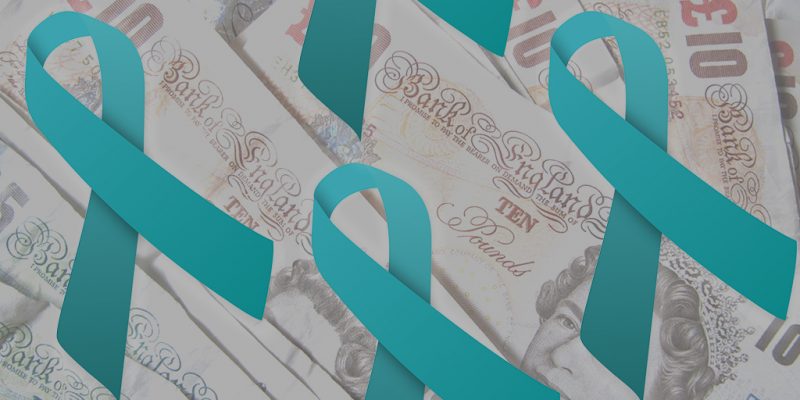While there are some obvious problems that come with living with cancer and going through the diagnosis and treatment there are some concerns and burdens that people do not always consider.
For many people, although we live in a country that has free universal healthcare, financial stress can be quite prominent as they receive a diagnosis and start treatment, especially hard treatment such as chemotherapy or radiotherapy.
Whilst cervical cancer doesn’t usually have many symptoms at an early stage, it is still a serious illness. Many people need to take time off work or reduce their hours which will, in turn, reduce their income. Patients report still needing to pay for transport to and from appointments and hospital parking, special dietary needs as well as the usual costs of rent, bills and childcare.
Dorset Cancer Care Foundation (DCCF) is a non-profit organisation founded seven years ago by three nurses who went through cancer themselves and realised the burdens that face patients and their friends and family.
The charity provides non-repayable grants to fund things such as transport, accommodation, food bills, childcare and even respite holidays to help alleviate some of the stress that it can cause.
Nikki Davies-Thomas, executive administrator and head fundraiser of DCCF said: “Stress financially can cause someone who is already going through a lot of emotional and mental stress with cancer, it can cause major problems.
“And it’s vital to their health that they stay positive and when they’ve got financial problems they’re not going to stay so positive.”
Mental wellbeing
Another thing to consider is the mental health and mental stress of those who are going through cancer.
Mrs Davies-Thomas says that sometimes the way that a person’s family and friends treats them after they are diagnosed can affect someone’s mental health.
She said: “I think where they feel as though their family all of a sudden feel like wrapping them up in cotton wool to protect them from anything else, and I think that can cause a bit of a mental illness for the person suffering with it because they feel as though they’ve got no independence anymore.
“I think it can affect both sides mentally.
“It’s also very important when a person goes into remission, when they’ve got a negative result instead of a positive result.
“All of a sudden the family, or friends, or outside of that say ‘oh you’re fine now so we’ll walk away, we don’t have to look after you so much anymore’ and I think that can cause quite a mental aspect to it.”
Counsellor at Be U Counselling, Kruti St Helen, who offers affordable counselling to those suffering through cancer as well as other grief and loss agrees that the way someone with cancer is treated by family and friends is a major factor in that person’s mental health.
She said: “I think when you have cancer, you have to kind of learn to accept that it’s an invasion in your body, and sometimes with a lot of cancer patients what they have to also come to terms with is how to manage other people.
“Sometimes they accept it, but it’s how other people have to deal with it, like family members and friends, because they might be okay with it but family and friends aren’t okay with it, and they often have to go through the process of chemotherapy or radiotherapy and then also have to empathise with their friend or their family and deal with their emotions rather than manage their own emotions with it.
“So they don’t really get time to feel and process their own feelings.”
Help is available, speak to DCCF or Be U Counselling if you are struggling with issues related to cancer.
For further reading on Buzz about Cervical Cancer Prevention Week see our article on the importance of getting a smear test, here.
Nikki Davis-Thomas also spoke to BUzz about the importance of attending smear test:
?️Buzz news speaks to Nikki Davis-Thomas from @dorsetcancer who talks about the importance of attending your smear tests. #smearforsmear #cervicalcancerpreventionweek #buzznews pic.twitter.com/Kh5ClzyUrt
— Buzz News (@buzz_bmth) January 23, 2020


 Sexual offence crimes on the rise in Dorset – Office for National Statistics reveals
Sexual offence crimes on the rise in Dorset – Office for National Statistics reveals